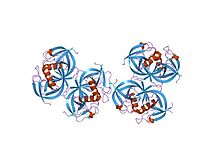Family of enzymes
Protein domain
Protein domain
In molecular biology, the Lon protease family is a family of enzymes that break peptide bonds in proteins resulting in smaller peptides or amino acids . They are found in archaea , bacteria and eukaryotes . Lon proteases are ATP-dependent serine peptidases belonging to the MEROPS peptidase family S16 (Lon protease family, clan SJ). In the eukaryotes the majority of the Lon proteases are located in the mitochondrial matrix . In yeast , the Lon protease PIM1 is located in the mitochondrial matrix . It is required for mitochondrial function, it is constitutively expressed but is increased after thermal stress, suggesting that PIM1 may play a role in the heat shock response. Lon proteases have two specific subfamilies: LonA and LonB, differentiated by the number of AAA+ domains found in the protein.
See also
References
"Proteolytic enzyme | Description, Types, & Functions | Britannica" . www.britannica.com . Retrieved 2022-12-05.Wang N, Gottesman S, Willingham MC, Gottesman MM, Maurizi MR (December 1993). "A human mitochondrial ATP-dependent protease that is highly homologous to bacterial Lon protease" . Proc. Natl. Acad. Sci. U.S.A . 90 (23): 11247–51. Bibcode :1993PNAS...9011247W . doi :10.1073/pnas.90.23.11247 . PMC 47959 . PMID 8248235 .
Barakat S, Pearce DA, Sherman F, Rapp WD (May 1998). "Maize contains a Lon protease gene that can partially complement a yeast pim1-deletion mutant". Plant Mol. Biol . 37 (1): 141–54. doi :10.1023/A:1005912831051 . PMID 9620272 . S2CID 94168 .
Van Dyck L, Pearce DA, Sherman F (January 1994). "PIM1 encodes a mitochondrial ATP-dependent protease that is required for mitochondrial function in the yeast Saccharomyces cerevisiae" . J. Biol. Chem . 269 (1): 238–42. doi :10.1016/S0021-9258(17)42340-4 . PMID 8276800 .
An, Young Jun; Na, Jung-Hyun; Kim, Myung-Il; Cha, Sun-Shin (2015-10-01). "Structural basis for the ATP-independent proteolytic activity of LonB proteases and reclassification of their AAA+ modules" . Journal of Microbiology . 53 (10): 711–717. doi :10.1007/s12275-015-5417-5 . ISSN 1976-3794 . PMID 26428922 . S2CID 14281538 .
Rotanova, Tatyana V.; Andrianova, Anna G.; Kudzhaev, Arsen M.; Li, Mi; Botos, Istvan; Wlodawer, Alexander; Gustchina, Alla (September 2019). "New insights into structural and functional relationships between LonA proteases and ClpB chaperones" . FEBS Open Bio . 9 (9): 1536–1551. doi :10.1002/2211-5463.12691 . ISSN 2211-5463 . PMC 6722904 . PMID 31237118 .
External links
This article incorporates text from the public domain Pfam and InterPro : IPR003111
Category :
Text is available under the Creative Commons Attribution-ShareAlike License. Additional terms may apply.
**DISCLAIMER** We are not affiliated with Wikipedia, and Cloudflare.
The information presented on this site is for general informational purposes only and does not constitute medical advice.
You should always have a personal consultation with a healthcare professional before making changes to your diet, medication, or exercise routine.
AI helps with the correspondence in our chat.
We participate in an affiliate program. If you buy something through a link, we may earn a commission 💕
↑
 crystal structure of n-terminal domain of e.coli lon protease
crystal structure of n-terminal domain of e.coli lon protease